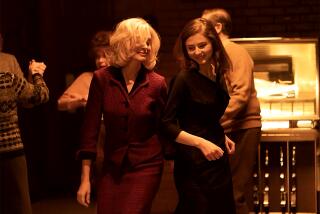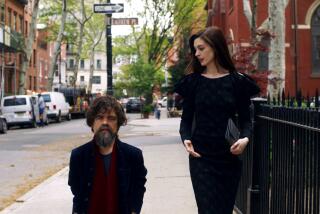Like falling in love again
- Share via
Director Jonathan Demme’s first fictional feature in nearly five years, “Rachel Getting Married” captures the anxieties of family dynamics and the difficulties of emotional closure. The film is shot in a loose, documentary-like way, and the rangy, exploratory visual style and therapy-infused dialogue caused it to be among the most talked-about films coming out of the Toronto International Film Festival, where it had its North American premiere earlier this month.
Rachel (Rosemarie DeWitt) might be the one getting married, but it is her sister Kym (Anne Hathaway) who makes herself the center of everyone’s attention.
Fresh out of rehab, Kym is a hard-charging, big-mouthed mess who doesn’t know how to live a life free of drama. A tragedy in the family has broken them all apart, and the divorced parents (played by Debra Winger and Bill Irwin) have never figured out how to put things back together.
Add a healthy number of wedding guests at the family’s leafy Connecticut home, and the stage is set.
With “Rachel Getting Married,” Demme, 64, has returned to the playful, deeply humanist storytelling of such early work as 1980’s “Melvin and Howard” and 1986’s “Something Wild,” both of which are widely acknowledged as having influenced a younger generation of filmmakers. The change is telling, coming after Demme’s years as an in-demand Hollywood director, a period that was sparked by his Academy Award-winning thriller “The Silence of the Lambs” and included such earnest, issue-oriented films as “Philadelphia” and “Beloved.”
After 2002’s “The Truth About Charlie,” an update of the classic Audrey Hepburn-Cary Grant pairing “Charade,” and 2004’s remake of “The Manchurian Candidate,” Demme said he was left feeling at loose ends.
“I wanted to just get out of the complexity of big moviemaking, having enjoyed it a lot and having stressed a lot,” he said during an interview just before “Rachel Getting Married” premiered in Toronto. “I stopped reading scripts and I decided I was really on a vacation. And then I started to get the itch to film something about a year after that.”
Demme turned to documentaries, crafting “Neil Young: Heart of Gold” and “Jimmy Carter Man From Plains.” He also has been working on a documentary about New Orleans and the aftermath of Hurricane Katrina.
“The further I got away from fiction films, the more I felt really comfortable being away from fiction films,” he continued. “I still loved seeing them but [had] zero interest in making them.”
Inspired by . . . what?
THAT IS, until his friend, director Sidney Lumet, called to ask him to read a script that his daughter, Jenny Lumet, had written. Demme, simply out of respect for the senior Lumet, agreed.
“I read the script and I thought it was fantastic,” Demme said. “But I still didn’t want to do it; I didn’t want to go back there. Then I realized that script could provide me with the opportunity to make a kind of film I love going to and a kind of film that excites me more than all others as a consumer. And that’s an independent-spirited, low-budget film.”
Considering how darkly emotional “Rachel Getting Married” can be -- Hathaway and DeWitt are already being touted as potential Oscar nominees -- Demme took particular inspiration from a rather unlikely source.
“It’s very funny,” he said. “I went to film festivals with ‘Manchurian Candidate’ and showing at all these same festivals was ‘Napoleon Dynamite.’ I’d look at that and go, ‘God, I wish I had the courage and the imagination to make a picture like that’ -- a film that’s not about budget, it’s about humanity. It’s about taking a fresh approach to the subject and doing something original.”
Demme recruited Declan Quinn, the cinematographer he had used on many of his documentary projects, and shot “Rachel Getting Married” in a fashion similar to those nonfiction outings, without rehearsing or blocking his actors. Digital cameras gave the director and the cast the ability to capture long, extended takes without having to worry about stopping to load more film.
He also opted for a fairly radical approach in terms of incorporating music into the production, something he said he’d been thinking about for a long time. “I’m so in love with this marriage of movies and music and the endless ways that can occur,” he said. “Instead of coming in later with a composer or with some source music that will respond to what the actors have done, we’re going to have the actor respond to the music they’re hearing somehow or other in their performance.”
That meant incorporating musicians into the wedding party as a way to believably have them around to play live on the set during production. Demme realized the idea was working when he was shooting an early scene in which Hathaway walks down a hallway and the actress began to pace her movements to the music being played by violinist Zafer Tawil, which was wafting in from another room. At one point in the film, Hathaway pleads for a break in the music, which Demme said reflected her genuine response to the musicians’ constant noodling and tuning.
He also tried to foster a family atmosphere on the set, hiring people he had met while working on his documentaries as well as family and friends. Among the faces familiar to Demme are film producer Roger Corman, musicians Robyn Hitchcock and Sister Carol East, and even his own children. The role of the groom, played by Tunde Adebimpe of the indie-rock group TV on the Radio, initially was offered to director (and avowed Demme fan) Paul Thomas Anderson, who after a few script readings turned it down to work on his Oscar-nominated epic “There Will Be Blood.”
While “Rachel Getting Married” might seem like a fresh breeze blowing through Demme’s creative spirit, this isn’t the first time that the filmmaker has found himself at a crossroads careerwise. In the mid-1980s, after having the film “Swing Shift” taken away from him to be recut, he felt similarly over Hollywood. But after reading the script to “Something Wild” he catapulted into the phase that would culminate with “The Silence of the Lambs.” Where he heads next will likely determine whether “Rachel Getting Married” is remembered as a recap or a refresher. “Now that I’ve made this movie, I do feel reborn as a filmmaker,” he said.
--
More to Read
Only good movies
Get the Indie Focus newsletter, Mark Olsen's weekly guide to the world of cinema.
You may occasionally receive promotional content from the Los Angeles Times.











